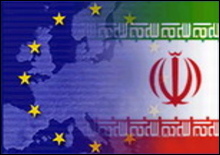Iran: Case study for diplomacy
Students of diplomacy will be speaking about this case for years to come

The Iranian nuclear question is an interesting one which brings into the game all the main players on the world stage and symbolizes the focal point where civilizations and modus operandi meet.
The case
The Islamic Republic of Iran claims that it has the right under international law to produce nuclear fuel as a source of energy, indeed nations are encouraged to find alternatives to fossil fuels.
The West, personified by the USA and three European states (the UK, France and Germany), threatens to refer Iran to the UN Security Council and to impose sanctions if Iran does not immediately refrain from pursuing its nuclear programme. There have even been unfounded claims that Iran is producing weapons-grade nuclear fuel.
The arguments
Iran claims that it is using nuclear technology to produce fuel for peaceful purposes, namely to produce energy. This is its right under international law.
Another question is the very issue of nuclear weapons. If the west stood by and watched Israel develop a nuclear weapons capacity, during the time in which a non-proliferation policy was supposed to be in force, where is the basis for an argument that Iran cannot do the same? Or if Iran cannot develop such weapons, why can Israel?
Because Iranians have beards? Or because they are seen and painted as a bunch of lunatics by a western press, hostile because they go to church on Fridays and not Sundays? And because Washington is caught in the grip of the Jewish lobby?
The International Atomic Energy Agency's Director, Mohammed El Baradei, has stated that the agency is seriously concerned over Iran's decision to remove IAEA seals on enrichment-related equipment.
Iran claims that it always informs the IAEA about what it is intending to do, that the equipment could be used for enrichment but that it is not being used for this purpose and anyway, the IAEA has already been investigating the programme for three years.
The IAEA wants to carry out a process of dialogue but with a complete moratorium of all of Iran's research activities, while Teheran claims it is only performing acts to which it has a fundamental right under international law.
The international players
Yet again, Washington and its lackeys in Europe are quick to jump the gun, mentioning referrals to the UNSC and sanctions. In the case of Iraq, sanctions were responsible for the murder of hundreds of thousands of children and other innocent civilians. In the case of Cuba, sanctions over the years have been directly responsible for countless deaths through disease.
Therefore what use are sanctions? This is only a policy defended by Washington which tries to punish leaders by killing innocent people.
As usual, the Russian Federation appears as the player with most common sense, the most balanced argument and the policy which follows the norms of international diplomacy: discretion, tact, debate, discussion and dialogue while urging Teheran not to isolate itself and to continue negotiating.
Following President Putin's statement on Monday that Russia, the E.U. states and USA shared common views on Iran, urging caution and stressing the need for collaboration, the Foreign Minister Sergei Lavrov has declared today that “The question of sanctions against Iran puts the cart before the horse - sanctions are in no way the best, or the only, way to solve the problem.”
Russia has long defended a policy under which Iran's spent nuclear fuel would be shipped to Russia. In this way, Teheran would keep its peaceful nuclear programme and Russia would guarantee that the fuel was put to good use. This measure is being considered by Iran.
However, Moscow has also declared that Teheran must do much more than it has done, returning to a moratorium on enrichment before initiating a series of talks with worried western powers.
On one side, panic, hysteria, threats and bullying – which is known as carrot and stick diplomacy (do it or I will hit you) – and on the other, firm, determined crisis management within the spirit of international law, taking all sides into consideration, preaching collaboration while making the position clear. This is called International Relations (let us discuss issues in the proper forums of law, respecting all sides and reaching a consensus without resorting to, or mentioning, force).
Students of diplomacy will draw their own conclusions.
Discuss this article on Pravda.Ru English Forum
Subscribe to Pravda.Ru Telegram channel, Facebook, RSS!


